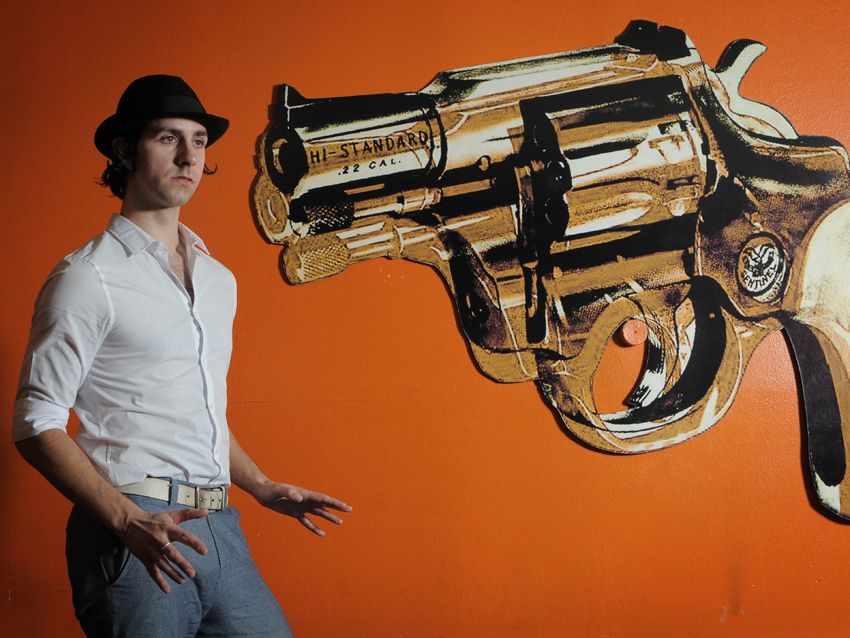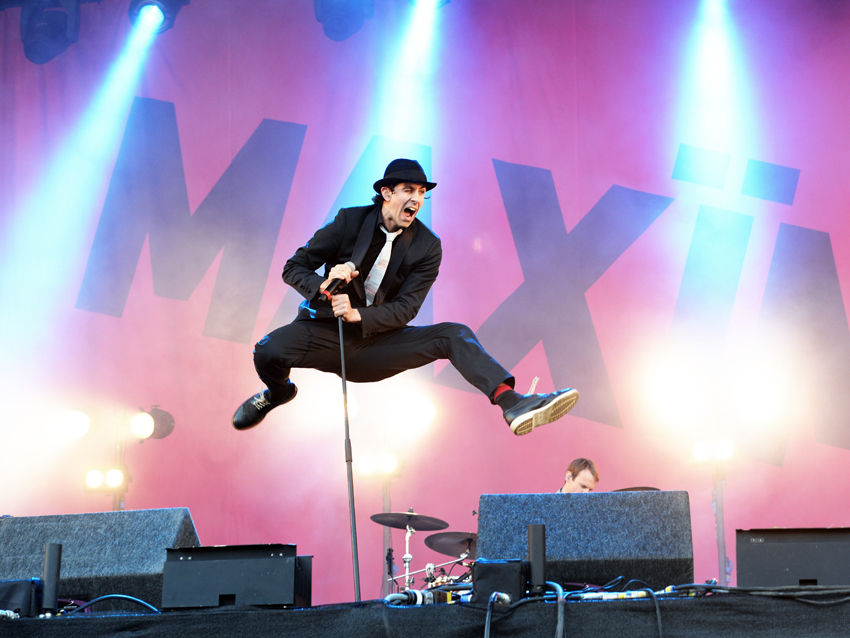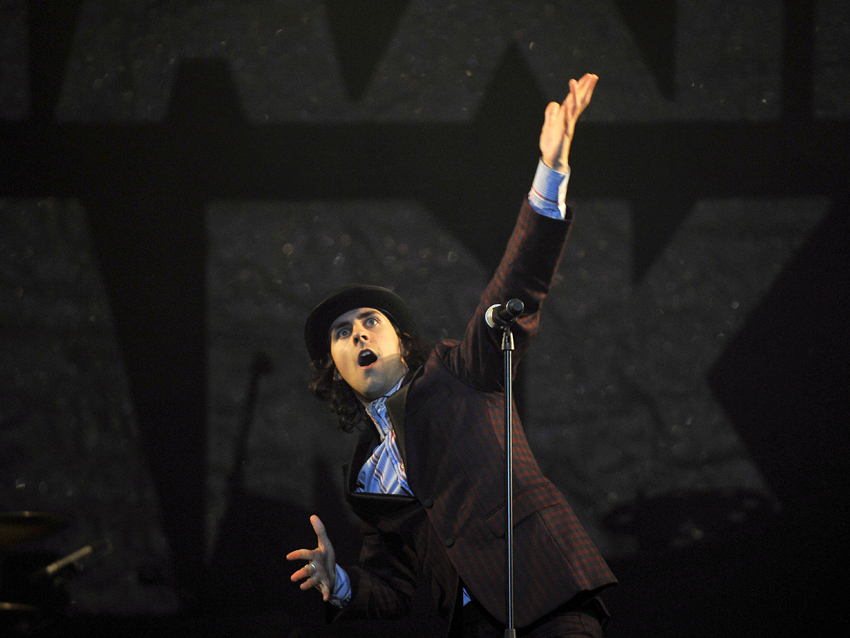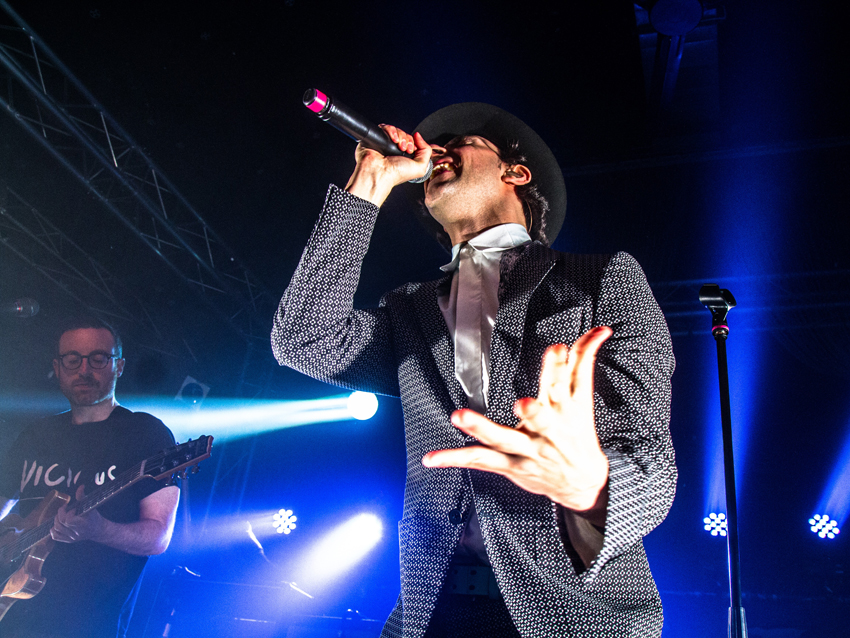Paul Smith talks Too Much Information
Maximo Park frontman on capturing ideas and paring down

Paul Smith talks Too Much Information
Since Maximo Park formed in 2000 they've watched scenes come and go, from the 'new rock revolution' to 'nu rave' and beyond.
Yet these Warp Records-signed art-rockers are still fuelled by the kind of karate kicking energy that they started with - and still blurring the lines between poetic lyricism, rocket-boosted riffs and sci-fi electro.
In the wake of the release of fifth record Too Much Information, MusicRadar caught up with frontman Paul Smith to discuss building their own studio, Alex Turner's ‘rock and roll will never die' speech, and how new bands can succeed in today's music industry...
Maximo Park have always had electronic elements, yet they seem to have come to the fore with new songs. Has the songwriting process changed?
“The process it's pretty similar really. One of the ways that we end up with final songs is somebody sending something to me by email - it used to be Duncan [guitarist] giving me a CD he’d burnt. Whoever had a song would pass it along and I would try and come up with a melody and get the right lyrics.
“I suppose in the past, one of the hallmarks of our sound was to have everything going at once. We are quite a maximalist band in that sense.We like the tussle between different elements in the sound to be something that allows them to have repeat listens, where they find new and different parts in there.
“But you're always trying to change the way you do things in order to keep things fresh for yourself and the listeners, so it made sense for us to do something a little bit different on this record. As you suggest, the electronic elements have always been there, so I suppose it's a question of exposing some of them. It's been more of a radical shift because we've taken a few things out rather than leaving everything in.”

Rock and roll with a twist
Were there any instruments on this record that you found to be triggers to creativity?
“Well to go to Brain Cells, I think it was a Little Phatty that Duncan used on that, and the acquisition of that synthesiser directly led to the birth of that song. So that's one pretty easy example to cite. But overall, having and building our own studio, as well as recording the album ourselves, was the main catalyst for the album sounding different.
“We started off in Sunderland working with our friends in Field Music, and we mixed it up a bit in those sessions. They had a marimba in the corner of the studio, and we were messing around with it, plinking and plonking, and ended up with it on the record.”
Did you consciously do anything during the making of the record that prompted thinking outside the box, such as trying a studio technique that took you out of your comfort zone?
“Yeah, when we recorded Where We're Going, we decided to record around one mic in a kind of '50s style, in the way people used to do it before multi-tracking and the advent of different styles of microphone. We just thought: 'it's that kind of song!' We wanted to get a Jonathan Richman style, '50s rock and roll element with a twist in, somewhere along the line.”
What DAW were the band using?
“I think we were using ProTools, and recording directly into that through lots of different leads going around our studio. We used to record four track and eight track, and our first recordings are like that. before we got signed. That was one of the reasons we ended up on Warp Records, because they'd seen our 7" that Duncan had recorded.”

Rock and roll typewriters
How do you capture ideas? Do you have an app on your phone?
“I've got a dictaphone on my phone, and you can hum something into the phone or, if you're near a guitar, get something down pretty quickly. If you've got a Mac, Garageband is pretty simple to just put down a few layers of harmonies and ideas.
“When I'm out on the road I have a note-book, and you've always got your phone on you now. It's not as romantic as carrying a typewriter - which I used to do! Typewriter in the back of the van… you get sick of carrying those things around [laughs].”
What did you think of the much-discussed speech by Alex Turner at the Brit Awards, that "rock and roll will never die", and indeed the suggestion by the head of Radio 1 that guitar music is due a comeback?
“I think it's pretty obvious that rock and roll's not going to die, you know? Elvis is still big, we've just been listening to Buddy Holly and Screaming Jay Hawkins. Perhaps people won't listen to it in great numbers because it hasn't been given exposure by a radio station, or by a media that is involved in a cyclical thing - which I suppose was suggested by Alex Turner. Dropping the microphone at the end probably undermined the point he was trying to make [laughs] although that's open to debate.
“People seem to have responded to it in quite a trenchant, 'us and them' kind of way, which is a very reductive way of looking at music. I wouldn't be in the corner of rock and roll, it's just one aspect of music that I like.
“On the record there's a song called My Bloody Mind where it's just one great riff. And you could debate it: there are other, more electronic songs on the album, so should we be pushing music forwards? But there's something primitive and enjoyable about rock and roll, and there's something primitive and enjoyable about a dance beat, or Justin Timberlake's falsetto.”

Being yourself
The fact you've been signed to Warp is perhaps symptomatic that there's more to the band than just guitars. Did you find being on that label an education in any sense?
“Warp was a label that we all admired anyway. We'd all been influenced by it in our teenage years, with Aphex Twin or Autechre, or people like Vincent Gallo. When I was first starting to make music I heard the Buffalo 66 soundtrack and I was making lo-fi, downbeat music and recognised that what I was doing was not a million miles away from that. Then you hear that he's released an album on Warp, and it gives you respect for the label.
“So I think in that respect, because they were brave and adventurous with music, we'd already learnt a lot from Warp just as fans. But when we signed to them it was almost like we were learning from each other. They'd never really taken on a band quite like ourselves before, so I suppose they were trying to find out what we were thinking and put our ideas across, rather than making us a 'Warp band'.”
Do you have any advice for young bands out there who are just starting out?
“One thing I would say is try and think about what you have that nobody else has. I suppose that's a kind of marketing technique, but I see it as more a thing where you've got to be yourself. There aren't any other options in my opinion. If you're doing something that's not true to you, perhaps something that might make you money or get you attention from the opposite sex or whatever, those things are not terribly evil intentions to have in life, but when you're making music the music should come first.
“The music should be a self-expression, something you're trying to get across, and that's something that's obvious with our band. If people were to listen to all our records they could hear the evolution of the band, but the main principles behind the band are the same. We still make music along the same ethos that we originally did, and somehow I don't think anyone else is doing it.”
For more information visit the official Maximo Park website, or connect with the band on Twitter or Facebook.